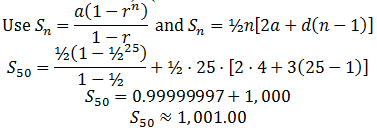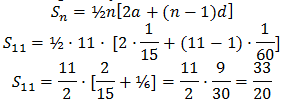💎 Using particular sum formulae as follows:
(i). Sn=½n(a+ℓ)
(ii). Sn=½n(a+an)
(iii). Sn=½n(2a+(n-1)d)
(iv). Sn=Sn-1+an, i.e., an=Sn–Sn-1
📌 Example 1. In an arithmetic sequence, the first term is 2, the last term is 29 and the sum of all the terms is 155. Find the common difference.
✍ Solution:
Here, a=2, ℓ=29 and Sn=155.
Let d be the common difference of the given arithmetic sequence and n be the total number of terms. Then, an=29.
2+(n-1)d=29 … (i)
The sum of n terms of an arithmetic sequence is given by
½n(2+29)=½⋅n⋅31=155
n=10.
Putting the value of n in (i), we get
9d=27
d=3.
Thus, the common difference of the given arithmetic sequence is 3.
📌 Ex2. In an arithmetic sequence, the first term is -4, the last term is 29 and the sum of all its terms is 150. Find its common difference.
✍ Solution:
Suppose there are n terms in the arithmetic sequence.
Here, a=-4, ℓ=29 and Sn=150.
½n(-4+29)=150
n=(150⋅2)/25=12.
Thus, the arithmetic sequence contains 12 terms. Let d be the common difference of the arithmetic sequence.
[an=a+(n-1)d]
-4+(12-1)⋅d=29
11d=29+4=33
d=3.
Hence, the common difference of the arithmetic sequence is 3.
📌 Ex3. The first and last terms of an arithmetic sequence are 5 and 45 respectively. If the sum of all its terms is 400, find the common difference and the number of terms.
✍ Solution:
Suppose there are n term in the arithmetic sequence.
Here, a=5, ℓ=45 and Sn=400.
Sn=½n(a+ℓ)
½n(5+45)=400
n⋅½⋅50=400
n=400÷25
n=16.
Thus, there are 16 terms in the arithmetic sequence. Let d be the common difference of the arithmetic sequence.
[an=a+(n-1)d]
15d=45-5=40
d=40/15=8/3.
Hence, the common difference of the arithmetic sequence is 8/3.
📌 Ex4. In an arithmetic sequence: given a=8, an=62, Sn=210, find n and d.
✍ Solution:
Here, a=8, an=62 and Sn=210.
The sum of n terms of an arithmetic sequence is given by
210=½n⋅(8+62)
210=35n
6=n
⇒an=a+(n-1)d
62=8+(6-1)d
54=5d→d=54/5
📌 Ex5. In an arithmetic sequence: given a=3, n=8, S=192, find d.
✍ Solution:
Here, a=3, n=8 and S=192. The sum of n terms of an arithmetic sequence is given by
192 =8/2[3+an]
192=4[3+an]
3+an=192/4=48
an=45
⇒an=a+(n-1)d
45=3+(8-1)d
42=7d
d=6
📌 Ex6. An arithmetic progression has 3 as its first term. Also, the sum of the first 8 terms is twice the sum of the first 5 terms. Find the common difference.
✍ Solution:
We are given that a=3. We are also given some information about the sums S8 and S5, and we want to find the common difference. So we shall use the formula
for the sum of the first n terms. This tells us that
and that
So, using the given fact that S8=2S5, we see that
4×(6+7d)=5×(6+4d)
24+28d=30+20d
8d=6
d=¾
📌 Ex7. In an arithmetic sequence, the first term is 22, nth terms is -11 and sum of first n terms is 66. Find the number n and the common difference.
✍ Solution:
Here, a=22, an=-11 and Sn=66.
Let d be the common difference of the given arithmetic sequence.
Then, an=-11
=22+(n-1)d=-11
(n-1)d=-33 … (i)
The sum of n terms of an arithmetic sequence is given by
[Substituting the value off (n-1)d from (i)]
½n[2⋅22+(-33)]=½n⋅11=66
n=12.
Putting the value of n in (i), we get:
d=-3.
Thus, n=12 and d=-3.
📌 Ex8. If the sum of first n terms is (3n2+5n), find its common difference.
✍ Solution:
Let Sn denotes the sum of first n terms of the arithmetic sequence.
Sn-1=3(n-1)2+5(n-1)
=3(n2-2n+1)+5(n-1)
=3n2–n-2.
Now, nth term of arithmetic sequence, an=Sn–Sn-1
=6n+2.
Let d be the common difference of the arithmetic sequence.
=(6n+2)-[6(n-1)+2]
=6n+2-6(n-1)-2
=6.
Hence, the common difference of the arithmetic sequence is 6.
📌 Ex9. The sum of first n terms of an arithmetic sequence is (3n2+6n). The common difference of the arithmetic sequence is
✍ Solution:
Let Sn denotes the sum of first n terms of the arithmetic sequence.
⇒Sn-1=3(n-1)2+6(n-1)
=3(n2-2n+1)+6(n-1)
=3n2-3.
So, nth term of the arithmetic sequence, an=Sn–Sn-1=(3n2+6n)-(3n2-3).
=6n+3.
Let d be the common difference of the arithmetic sequence.
=6n+3-6(n-1)-3
=6.
Thus, the common difference of the arithmetic sequence is 6.
Answer: (a) 6




